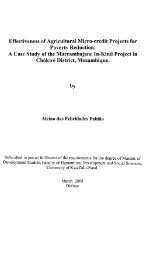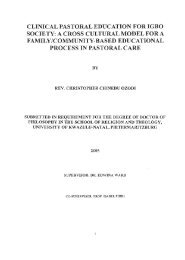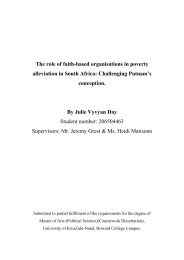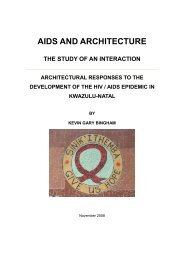View/Open - ResearchSpace - University of KwaZulu-Natal
View/Open - ResearchSpace - University of KwaZulu-Natal
View/Open - ResearchSpace - University of KwaZulu-Natal
Create successful ePaper yourself
Turn your PDF publications into a flip-book with our unique Google optimized e-Paper software.
(Young and Busgeeth, 2010). For example, in South Africa, some care workers have<br />
migrated to richer countries to look for better services as a result <strong>of</strong> increased workload and<br />
insufficient (Akintola, 2010; Young and Busgeeth, 2010). Furthermore, some <strong>of</strong> these health<br />
facilities are poorly equipped and are far away from the people, especially those in the rural<br />
areas (WHO, 2004; Juma, 2004).<br />
Most studies on HBC reveal that as a result <strong>of</strong> the impact <strong>of</strong> the HIV/AIDS epidemic on the<br />
health care system, the governments, NGOs, communities and HIV affected people have<br />
intervened by seeing what assistance can be <strong>of</strong>fered with regards to the care <strong>of</strong> chronically ill<br />
patients (Akintola, 2004). For instance, the Kenyan government approved the introduction <strong>of</strong><br />
home-based care for HIV/AIDS patients to relieve both financial constraints and<br />
overcrowding in the public health facilities following suggestions from the World Bank and<br />
other donor organizations (Opiyo et al, 2008). Similarly, In Botswana, the burden <strong>of</strong> caring<br />
for the people with HIV related illness has moved from the hospitals to the community and<br />
the family due to the shortages <strong>of</strong> beds and person power. This has then led to the<br />
communities seeing the necessity <strong>of</strong> developing community home-based care programs to<br />
support their friends and relatives in need <strong>of</strong> care (Kerkhoven and Jackson, 1995). Similarly<br />
in South Africa, due to the increased strain caused by the impacts <strong>of</strong> HIV/AIDS on the health<br />
care system, the government is supporting home-based care as a way <strong>of</strong> reducing the impact<br />
on the health care facilities (Akintola, 2010).<br />
2.4 Home based care: definition and its relevance<br />
The term home-based care (HBC) was initially used to refer to a programme that <strong>of</strong>fers<br />
health care services to support ill persons (WHO, 1999). HBC can be defined as the care<br />
given to the terminally ill in the privacy <strong>of</strong> their own home, usually by their relatives who are<br />
supported by skilled health care providers (WHO, 2002). Additionally, the definition <strong>of</strong> HBC<br />
has expanded to include a full range <strong>of</strong> services and settings available to terminally or<br />
critically ill people in their own homes. HBC is the care given to patients with chronic<br />
illnesses such as HIV/AIDS, cancer, tuberculosis and mental illness in their own homes and<br />
within their local communities (Wegelin-Schuringa et al., 2003). Some <strong>of</strong> the services<br />
provided in HBC include physical activities; spiritual activities such as, prayers psychosocial<br />
activities like counselling and educating family carers on how to take care <strong>of</strong> the patients.<br />
9
















